A recent Pew Research Center headline reads, “About Six-in-Ten Americans Say Legalization of Same-Sex Marriage Is Good for Society.” The article goes on to discuss the findings of a new poll that has found that 61% of Americans have a “positive view of the impact of same-sex marriage being legal, including 36% who say it is very good for society.” It reports that just under 40% have a negative view, with 19% claiming that same-sex “marriage” is “very bad.”
These numbers have changed dramatically from a 2003 poll that found that “32% [of respondents] said same-sex couples should receive the same rights as married couples” and another 32% who said the issue really doesn’t matter to them.
As we can see, the times are changing. But what does that mean for society?
Changing the Mindset of the Country
In a 2014 article entitled “The Scientific Case against Homosexual ‘Marriage,’” HLI’s Brian Clowes illustrates the cheapening of marriage with an analogy that helps us see the reality of what same-sex marriage does to the concept of a marriage between a man and a woman:
How does it hurt you if I print my own $20 bills? Well, it won’t hurt you at first, but if more and more people begin to print their own $20 bills, the less all $20 bills are worth, including the real ones issued by the government. If enough people print enough of their own money, eventually all of the $20 bills (and all of the other currency) become worthless.
Homosexual “marriage,” like all counterfeits, cheapens and degrades the real thing.
As with counterfeiting, the damage to natural marriage is cumulative and not immediately apparent. The more varieties of counterfeit there are, the more the real thing gets lost in the variety.
The impact of this “counterfeiting” on society is staggering. And as the push to redefine “marriage” intensifies, the more we feel bullying tactics from social media, TV, the news, and other outlets to agree with this redefinition.
For instance, we hear statements from people like Masha Gessen, a Russian-American journalist who has written extensively on LGBTQ issues. She said in a 2012 talk show:
The institution of marriage is going to change, and it should change. And again, I don’t think it should exist. And I don’t like taking part in creating fictions about my life. That’s sort of not what I had in mind when I came out thirty years ago. I have three kids who have five parents, more or less, and I don’t see why they shouldn’t have five parents legally….
[After my divorce,] I met my new partner, and she had just had a baby, and that baby’s biological father is my brother, and my daughter’s biological father is a man who lives in Russia, and my adopted son also considers him his father. So the five parents break down into two groups of three…. And really, I would like to live in a legal system that is capable of reflecting that reality. And I don’t think that’s compatible with the institution of marriage.
If her convoluted family dynamics sound confusing to read, imagine how confusing it is for those children to live.
And it is the children—tomorrow’s adults—we should be primarily worried about.
We see this same kind of attitude from Paula Ettelbrick, former director of the National Gay and Lesbian Task Force and also the executive director of the International Gay and Lesbian Human Rights Commission. Before she passed away in 2011, she was outspoken about her beliefs. At one point she stated, “Being queer means pushing the parameters of sex, sexuality and family and in the process, transforming the very fabric of society. We must keep our eyes on the goals of providing true alternatives to marriage and of radically reordering society’s view of reality.”
“Transforming the very fabric of society” and “radically reordering society’s view of reality” sound like she has her own interests in mind rather than the best interests of children or society.
We see this very same attitude in our government leaders as well.
The Respect for Marriage Act
Even though it’s highly unlikely, many fear that because the Dobbs decision overturned Roe v. Wade and sent the decision back to the states to decide the legality of abortion, the same will happen with the 2015 Obergefell v. Hodges case that determined that same-sex marriage was constitutionally protected.
Because of this fear, in December 2022 President Biden signed into law the Respect for Marriage Act. According to the summary of the act, it “replaces provisions that define, for purposes of federal law, marriage as between a man and a woman and spouse as a person of the opposite sex with provisions that recognize any marriage between two individuals that is valid under state law.”
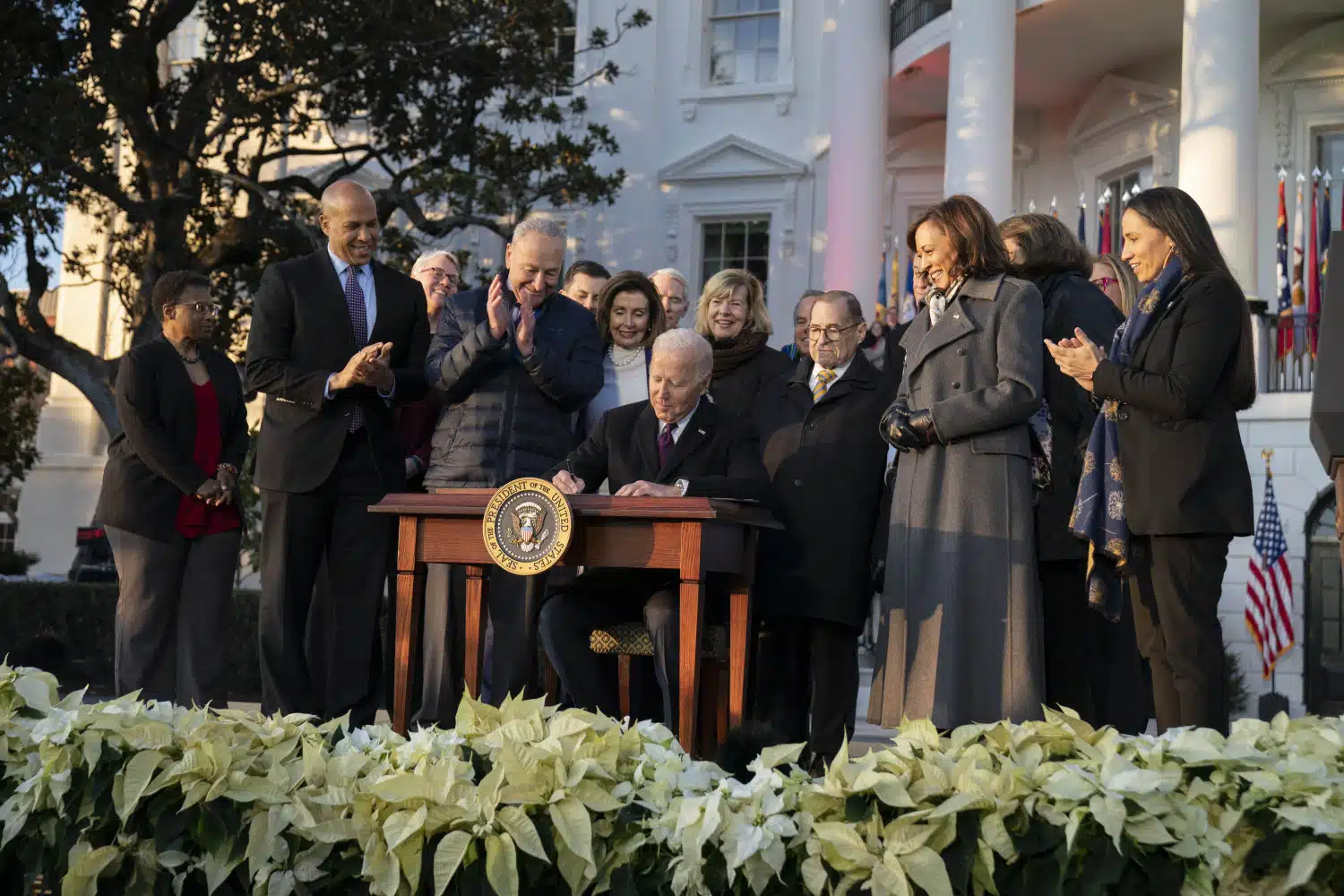
President Joe Biden signing the Respect for Marriage Act
This act, which does not respect marriage as a union between a man and a woman, negated the Defense of Marriage Act, which defined marriage as such.
CNBC reports, “The Respect for Marriage Act does not guarantee the right to marry. It specifies that states must recognize same-sex marriages across state lines and that same-sex couples have the same federal benefits as any married couple.”
In other words, if Obergefell were to be overturned and the decision regarding marriage were to return to individual states, the act forces states to recognize marriages that were legally performed in another state.
What the Church Teaches about Marriage
First, we want to be clear that the Catechism of the Catholic Church teaches that those who experience same-sex attraction “must be accepted with respect, compassion, and sensitivity” and that we must never behave cruelly or in a hateful manner toward them (2358).
It is not a sin to experience same-sex attraction. And it is never right to hurt or ostracize anyone because they feel attracted to someone of the same sex. Those who feel same-sex attraction are children of God and are no different in His eyes from anyone else. However, the Church teaches that sexual acts that result from this attraction—just like the sexual acts performed by an unmarried heterosexual couple—are immoral.
The Catholic Church upholds the sanctity and dignity of marriage by teaching that a marriage must be between one man and one woman. A marriage has two ends, or purposes. A marriage should be both unitive and procreative. That means that a marriage unites a couple and that the couple must remain open to the life that can come as a result of their union.
Of course, we know that not every heterosexual couple can physically have babies, but this inability does not change their openness to babies.
Same-sex couples cannot create children together. It’s simply not scientifically possible. And as the Catechism says of homosexual couples, “They close the sexual act to the gift of life. They do not proceed from a genuine affective and sexual complementarity” (2357).
Further, we know that throughout history, marriage has traditionally been between and man and a woman. People knew that the purpose of marriage was to create families to strengthen society. They understood that families are the foundation of societies and that couples must procreate and raise mentally and physically healthy children if society is to flourish. As Aristotle once said of families, “The family is the association established by nature for the supply of men’s everyday wants.”
So at the Council of Trent in 1563, the Catholic Church stated its doctrine on marriage and established laws regarding what constituted a sacramental marriage. This is based not only on Christ’s teachings in Matthew—that a marriage is between a man and a woman, that “a man shall leave his father and mother and be joined to his wife,” and that “what God has joined together, no human being must separate”—but also on the fact that society needs families to thrive and that a man and a woman who now join together in love should adhere to this vow for the rest of their lives. Simply put, societies flourish when families flourish.
Related: What Does the Catholic Church Teach about Homosexuality?
An argument we often hear is that the Catholic Church should not have a say in sexual morality because the Church “supports” pedophiles. But let’s be clear. While some in the Church’s history have committed horrific acts, this does not mean that the Church supports these acts. Sin and evil are pervasive. Those committing these terrible acts were broken human beings, and their actions were never justified by Church teaching or Church doctrine. In fact, their actions are condemned by Church doctrine. The Church has never condoned—and will never condone—sexual acts with children or sexual acts against someone’s will. These despicable events go against all that the Church teaches.
Why Keep Marriage Between One Man and One Woman?
As the Pew poll indicates, people’s views are changing. But are they changing to the detriment of society?
Those who want to define marriage as between one man and one woman do not do so to discriminate or to make those who feel same-sex attraction hated or unloved. In fact, they do it out of love—love for the sanctity of the marriage covenant. Love for children. And love for a society that values a family where a mother and a father complement each other and can raise their children together.
When we look at the children of same-sex couples, we must realize that they are missing out on having one or both parents, depending on how they were created.
Since two people of the same sex cannot naturally create a child, they have to find another way to have children. If one or both of the members of the couple does not have a biological child from a former relationship, the couple will either create a child artificially, adopt an embryo, hire a surrogate, or adopt a child already born.
Let’s look at the artificial creation of a child or the hiring of a surrogate. In these instances, a child is intentionally created not because the parents are loving and open to life and have created a child within an act of love. The child is created simply because the parents want him. This scenario becomes about what the parents want rather than what is best for the child. The child then becomes a commodity. He is created with the specific purpose of growing up in a household where he is intentionally kept from either his biological mother or father or both.
Think about your own parents for a moment. Barring instances of abuse or neglect, most people would never want to give up one or both parents. We would feel lost without them. It is not fair to a child to create him with the purpose of keeping him from a parent.
Yet this is happening more and more often. And while a child of same-sex parents may be loved, he is still missing one or both biological parents. He is missing the gift of the complementarity of both parents. He is missing watching the interaction and communication of the most important male and female in his life. In essence, he is missing part of himself.
Some people may protest that adopted kids or kids in foster care also miss their biological parents. And that’s true. But creating a child specifically to keep him from his parents is very different from adopting a child and loving him and giving him a home when no one else could.
And though these children may also feel like something is missing because they do not know their biological families, if they are brought up in a home with both a mother and a father, they will have the benefit of the mother/father dynamic and of that complementarity. That will go a long way toward helping repair any hurt the child may feel by not being raised by his biological parents. That complementarity is something a same-sex couple cannot offer.
Are Kids Better Off with a Mom and a Dad?
In his article, Clowes addresses several myths about same-sex marriage. One of those myths is that children of same-sex marriages do just as well as children of heterosexual marriages. To this, Clowes responds:
There have been over a hundred studies performed on the effects of homosexual parenting on their adopted children. Some of them have found that homosexual parenting is bad for children, and some have found that it is beneficial. However, every single study showing that homosexual parenting is good for children was sloppily done, ignored basic scientific principles, or was done by the homosexuals themselves….
The only studies that have been performed to rigorous scientific standards by impartial researchers have shown that homosexual parenting is confusing and harmful to the psychology of children.
Clowes goes on to discuss a study done by researcher Mark Regnerus. This New Family Structures Study interviewed 15,000 adults ages 18 to 39 and asked them dozens of questions, including whether or not a parent had ever been involved in a same-sex relationship. This study “found that children raised by same-sex couples were significantly worse off than those raised by a man and woman in a committed relationship.” These people—now adults—said they “experienced significantly more depression, ill health, unemployment, infidelity, drug use, trouble with the law, sexual partners, sexual victimization, and unhappy childhood memories.”
As pro-lifers and as parents, we have to want better for our children. While thinking about this, I’m reminded of the old idiom that says that we’re only as strong as our weakest link. If we look around the world today, we will see a lot of sadness, especially among young people. While the reasons are many, they likely include the fact that a significant number of kids come from broken families. In fact, a 2019 article in World Psychiatry reports that “only about 60% of US children live with their married, biological parents.” This is indeed a sad statistic. And it gravely hurts our society.
If we want to help children develop into happy and healthy adults, we as a society must return to family values. We must look upon marriage as something that is vital to the health and well-being of all of society. We must change our mindset about the value of marriage and about our commitment to the vows. “Till death do us part” does not mean until I find someone better. It does not mean until I get bored. “Till death do us part” is a commitment and a call to live that love for a spouse.
If kids feel like they’re missing something in their families, if they aren’t valued members of their own families, if they have been treated like a possession, or if they have been ignored, they will have difficulty seeing their own worth and their own value as human beings. If they cannot see their own worth and value, they will not see these qualities in the people around them. This affects how they treat people and how they view the world. This in turn affects all of society. As one of my old psychology professors used to say, “hurt people hurt people.” It’s simple but true. And studies have shown that children who feel that hurt or neglect or who are missing a parent are more likely to grow up to have unhealthy relationships.
Allowing attacks on marriage and the family will only have detrimental effects on children and on society. We can see the results of this slippery slope of loose sexual morals. One example of this is the concept of “throuples.”
A Women’s Health article describes a throuple as “a romantic relationship between three people. Not to be mistaken for an open relationship (where people in a relationship have sex with people who are not their partner) or a threesome (sex between three people), a throuple is a balanced, consensual, and committed relationship.” The article goes on to justify this type of relationship because “it’s totally possible to be in love with more than one person at one time.”
And lest you think that this is an isolated thing, the article then cheers other types of relationships: “Thanks to the recent increase in visibility of the entire sexual spectrum (hooray!), the throuple (‘three’ + ‘couple’) is gaining more and more recognition, as are other forms of polyamory, the umbrella term for relationships involving more than two people.”
The article speaks of relationships with multiple people as something good and as something we should just accept. It’s part of the “you do you” mentality. But these are not healthy relationships. And these unhealthy beliefs are a direct result of the loss of respect for marriage between one man and one woman.
This is why we must change the mindset of our culture and help people understand the dignity and value of all people and the significance of keeping marriage between one man and one woman.
Many people don’t care about this or don’t see how vital this is. And some may think a marriage between one man and one woman is too much of an ideal to strive for because people are sinners and because there is evil out there. But when we stop striving for an ideal, we let the Culture of Death win.
Final Thoughts
I recently read a book called Change of Possession about a struggling Catholic family. And though the story is fiction, the battles the characters face are those we see every day in our country, especially when it comes to same-sex attraction. In the story, one of the characters, who is atheist, struggles with homosexuality and seeks the advice of a priest. I want to leave you with this beautiful scene because the priest speaks in love—and it is a moving example of how we must speak and act when we encounter those who experience same-sex attraction. Hate is never acceptable.
At one point, the young man asks about becoming Catholic, and the priest tells him:
I cannot promise you that you will feel Christ’s love enfolding you for the rest of your life, that you will wake up after baptism like you would wake up on the morning of a honeymoon, that you will never feel lonely, never feel disappointment or let down, or never wish you felt physical arms around you. I can promise you this, though. That if you truly open your heart to Christ, if you give yourself to Him completely, that the consolations in both this life and in the next will rank beside the most perfect marriage or the saintliest priesthood.
This young man—like many in our society today—was missing something in his life. He felt lost and alone. He felt swept up in a society that told him it’s okay to do whatever he wants with his body. He fell prey to a culture that shouts that anything pleasurable is good.
But as Christians, we know there’s another way. A better way. Though the world wants our sexuality to be the thing that defines us and to be the most important thing in our lives, we know that our sexuality does not wholly define us. We are so much more than sexual beings.
We are meant to grow up in families, nurtured and cared for by mothers and fathers. We are meant to live our lives understanding our own dignity and worth so that we can treat others with that same respect. We are meant to nurture and love the children God has given us.
And we are meant to make positive changes in society so that future generations can benefit from what we have done rather than lament our mistakes.
Related Content
Susan Ciancio has a BA in psychology and a BA in sociology from the University of Notre Dame, with an MA in liberal studies from Indiana University. Since 2003, she has worked as a professional editor and writer, editing both fiction and nonfiction books, magazine articles, blogs, educational lessons, professional materials, and website content. Fourteen of those years have been in the pro-life sector. Currently Susan writes weekly for HLI, edits for American Life League, and is the editor of its Celebrate Life Magazine. She also serves as executive editor for the Culture of Life Studies Program, an educational nonprofit program for k-12 students.


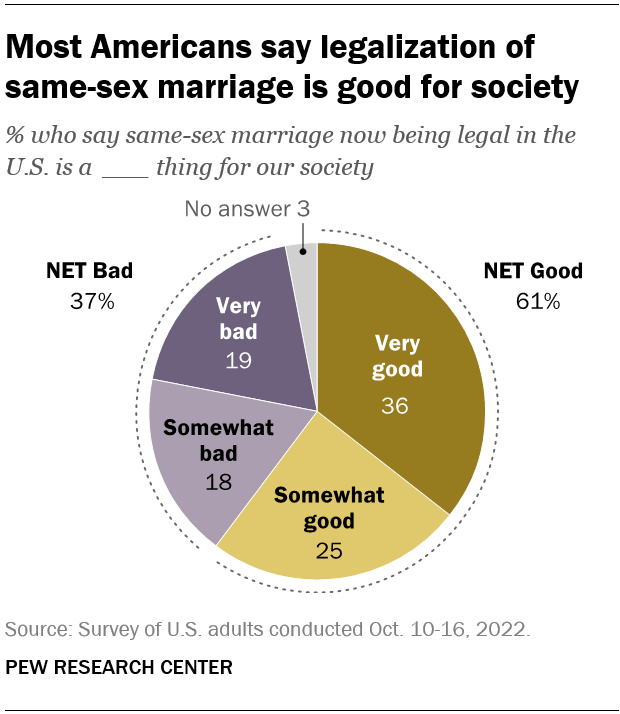


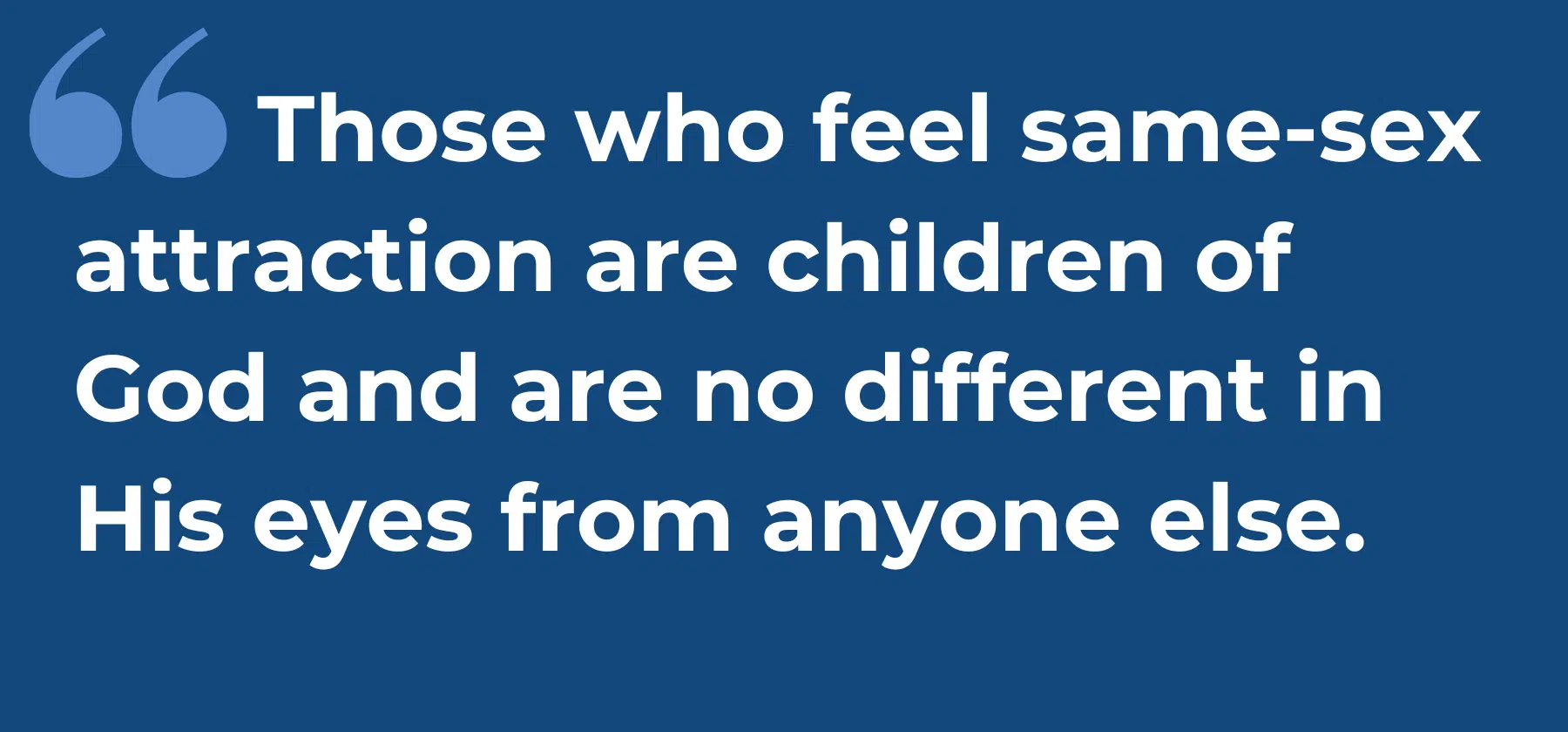

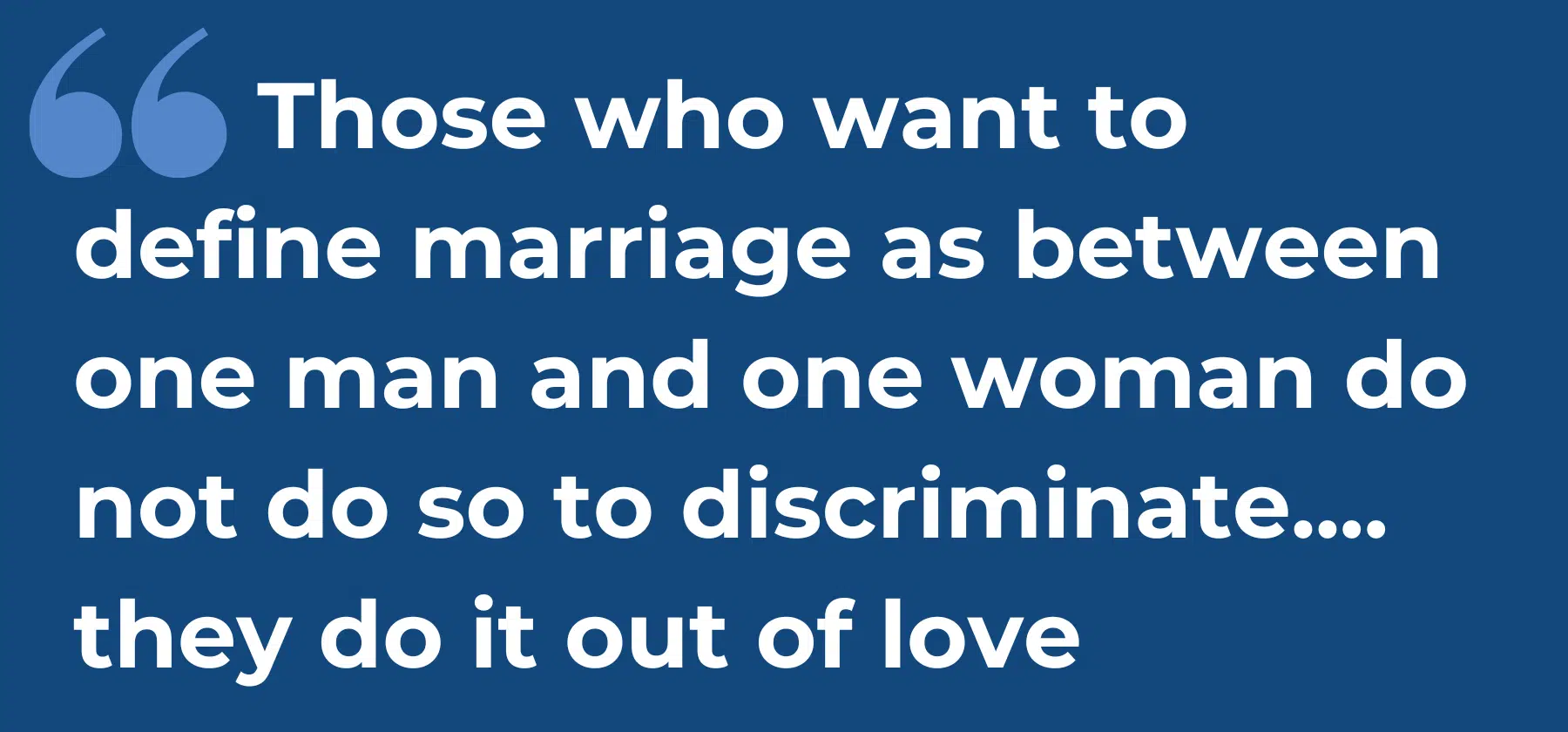
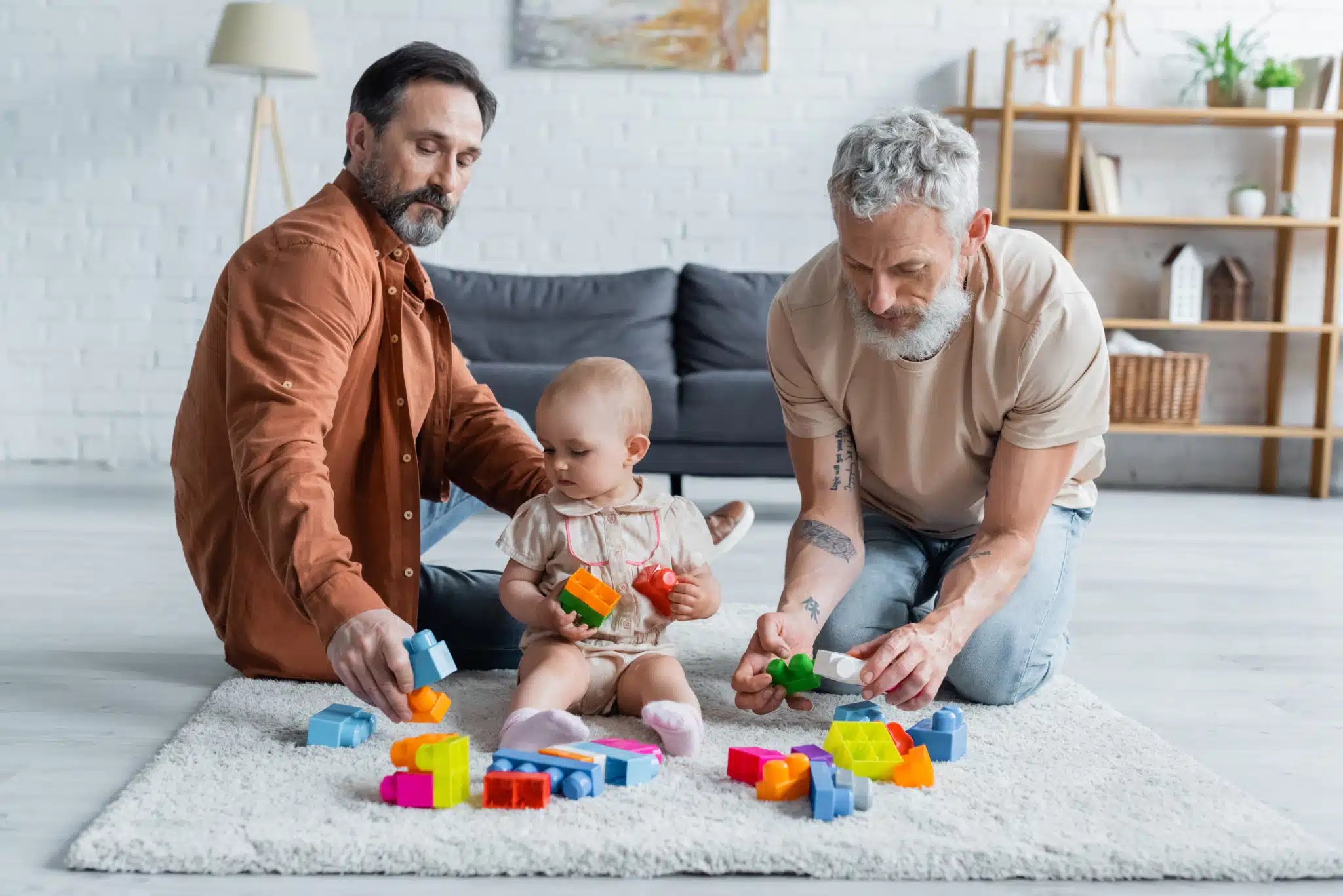
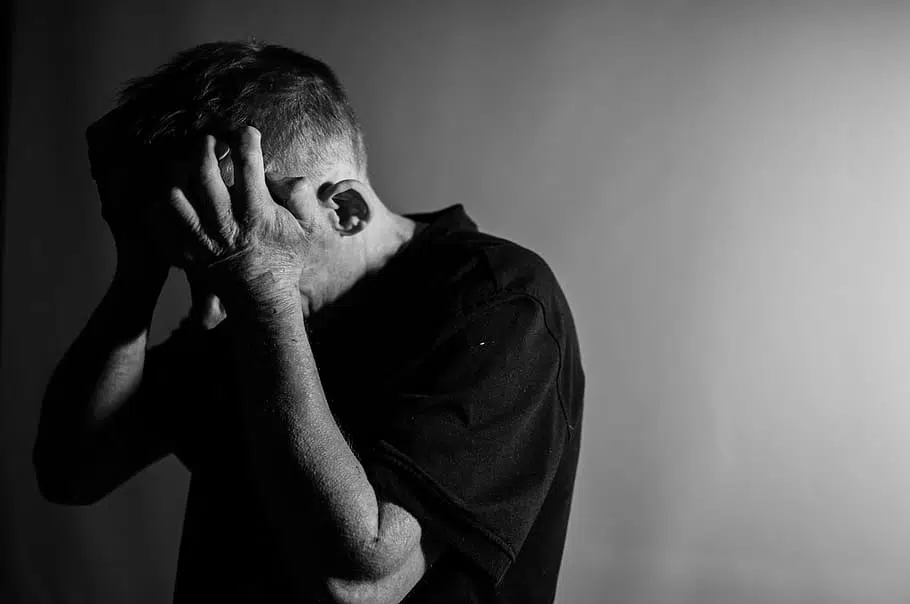
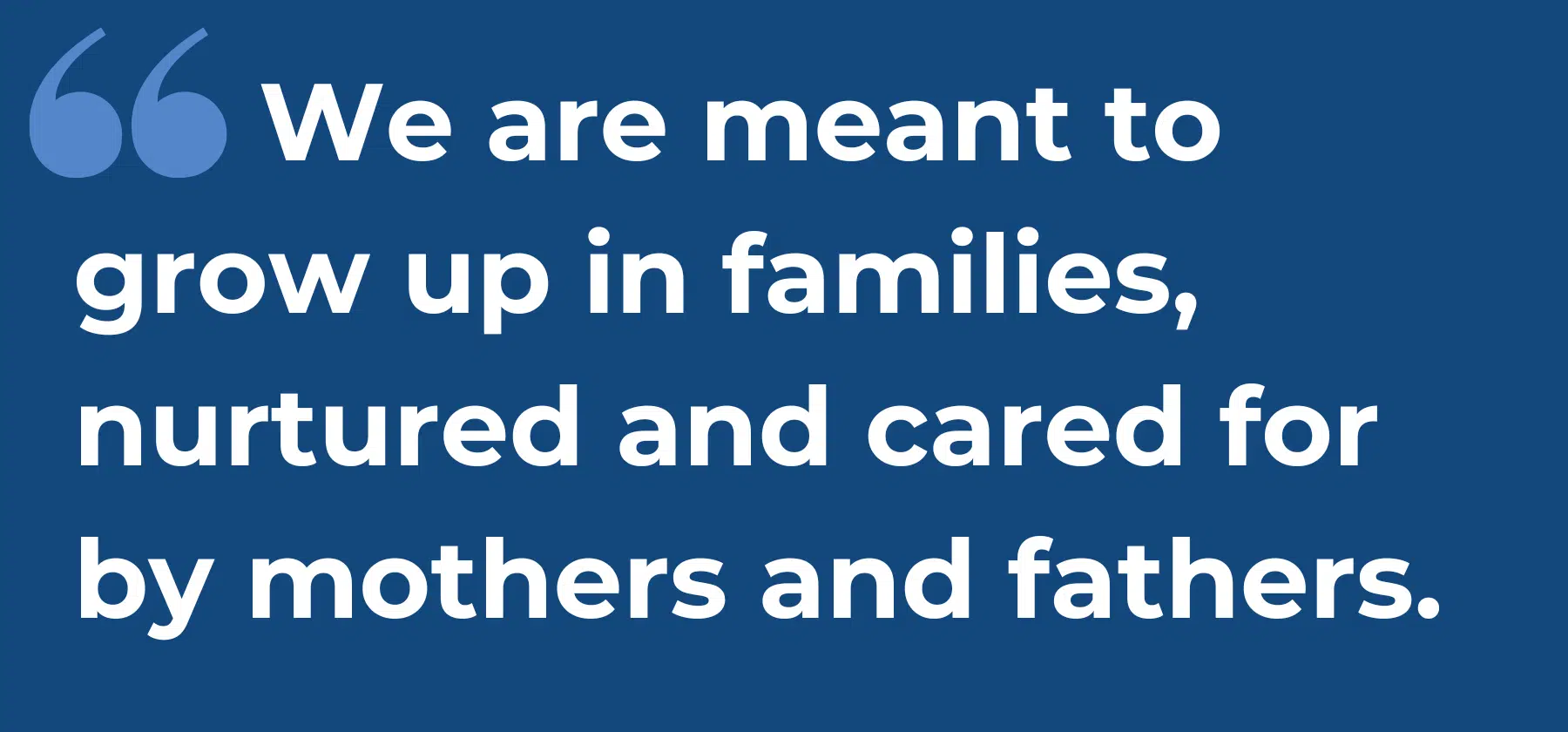



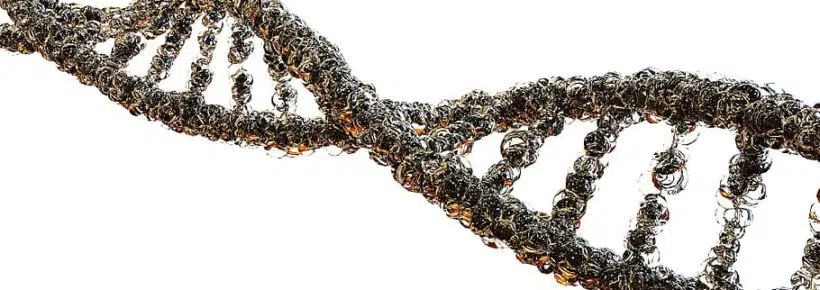

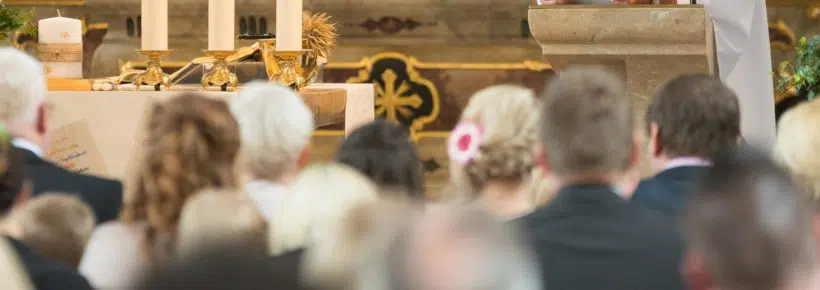



I wish this article could be told from the mountains to all of humanity!
The normalizing of these lifestyles and celebrating these lifestyles are a direct disobedience to our Creator & a denial of Him and His love. I am weary of seeing it all around.
Thank you for writing this.
Great article that holds the truth from God and his guidance for us now and forever. Thank you.
Thank you, Jennifer!
Dear John,
Thank you for your comment!
First of all, you are not hated by the Catholic Church. The Catholic Church cannot hate anyone. She does not hate anyone. The Church hates sin, but she does not hate any sinners. How could she? “All have sinned and fall short of the glory of God” (Romans 3:23). Christ himself told those who stood in judgement of the adulterous woman: “Let him who is without sin among you be the first to throw a stone at her.” The crowd of haters and would-be stoners dispersed, leaving Jesus alone with the woman. Jesus looked up and said to her, “Woman, where are they? Has no one condemned you?” She said, “No one, Lord.” And Jesus said, “Neither do I condemn you; go, and do not sin again.”
Jesus did not hate her, but told her to sin no more.
Right off the bat, this article reminds readers that:
To begin with, we must recognize that a homosexual orientation is not sinful in and of itself. Homosexual urges are similar to other human weaknesses in one way: they constitute an unnatural and unhealthy manifestation of our fallen natures, much like an excessive desire for drugs, money, food or alcohol. We are not sure why the Lord gives people such crosses to bear, but we certainly grow in virtue if we confront our weaknesses and, through His grace, defeat them.
Again, the article states:
A same-sex attraction will only cause damage to a person’s soul (and body) if he acts on his impulses, in the same manner that an alcoholic does no damage to himself until he begins to drink in excess.
Homosexuals who are chaste and who successfully struggle against their urges through a lifetime of self-discipline carry a very heavy cross indeed, and we should admire them. So the mere fact that someone has a homosexual orientation does not mean that he or she is a “bad” person.
This is not hate, John! You have a cross to bear, just as I have my crosses. Of course you can still be Catholic! You just cannot act on homosexual tendencies and be Catholic. That is the difference. You are a beautiful person and deeply loved by God, who created you. The Church accepts you, of course! But the Church does not and cannot accept the sin any more than she can and will accept any other sin. We are all in the same boat, as far as that goes! So take heart. “Go, and sin no more,” and I will do the same to the very best of my abilities.
God bless you dear!
You can’t read a real bible and not see God finds homosexuality detestable. Even cross dressing in Deuteronomy is condemned. And again from your post if you don’t support homosexuality it must be hate speach. Your post seemed more hateful than this article.
I agree
While I appreciate the diversity you bring (literally it made me very happy to see someone else that agrees with me) I’d like to invite you to leave the violent language out. Words like “rabid” and “nonsensical” feel like attacks and create division where we need to foster understanding. Like I wrote below this is just an invitation. Please don’t feel like I’m forcing you to do as I say.
With love,
Jackson
Can we keep the “laughing” out of this? Philip expressed an opposing viewpoint. I’d like to ask that you respect that and let it be instead of “laughing” at it. Just an invitation. Please don’t feel like I’m forcing you to do this. That’s really not my intention. Just inviting.
With love,
Jackson